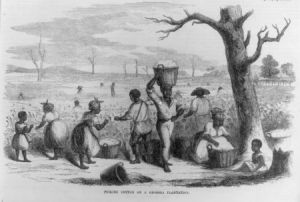 Today’s Georgia Baptist Christian Index offers a spirited defense of African slavery while arguing that slaves should at least be allowed to read the Bible, a practice long illegal in some Confederate states. As such, some white Baptists position themselves against a view popular among white Confederates at large that by learning to read, slaves will be further empowered to seek freedom.
Today’s Georgia Baptist Christian Index offers a spirited defense of African slavery while arguing that slaves should at least be allowed to read the Bible, a practice long illegal in some Confederate states. As such, some white Baptists position themselves against a view popular among white Confederates at large that by learning to read, slaves will be further empowered to seek freedom.
Doubtless our legislators will hesitate ere they repeal that clause of the Statute of 1829, which forbids masters from learning their slaves to read the Bible. But that they should not do so, is to our minds most obvious. For, the prime reason which led to such an outrage upon a God-given right to humanity, is now passed away, we hope, forever. The power which our malign enemies, the vile abolitionists of the North, once possessed for distributing their incendiary documents among our servile population, is their’s no longer.–[Harriet] Beecher [Stowe] may rant and [Horace] Greel[e]y may rave; but, save an occasional sheet, none of their insolent and anti-scriptural utterances will reach our people. As far, then, as abolitionary productions are concerned, we need not fear to give the power of reading to our slaves; but, even if it were certain that such would be perused, we contend that the benefit arising to the master and to society and to the slave himself by his reading God’s Word, would a thousand fold overbalance the probable evil results of an acquaintance with free-soil sentiments. The master would find in his slaves servants more docile, more obedient, more intelligent and more religious; society would possess a more conscientious and moral servile population; and the slave himself would be happier more self-respectful, posses juster ideas of his responsibilities, truer views of his own condition, and be far more likely to submit to what he had discovered in the Word of God to be the fiat of the world’s rulers. Thus would his Biblical knowledge counteract and overcome abolition teachings.
But higher still do we rise in our sense of obligation concerning this matter. We have no right to debar such a large class from personal perusal of the Bible. The Almighty intended his Word to be universally read: its truths intimately concern every immortal soul on earth; and unless we would be accessory to soul-murder, and assist in peopling hell, we must not close the sacred pages to any one.
In the eyes of our enemies and in the eyes of God, we stand guilty of an enormous offence against humanity, against the eternal interests of deathless souls, against inalienable rights of perishing fellow-beings.
Georgia and South Carolina must remove this foul blot from their escutcheons, or be forever entitled to the execrations of mankind and to the frantic curses of ruined millions in endless torment.
And now, when we seem just setting out upon a glorious race of separate nationality, it becomes us to signalize our entrance among the independent and enlightened nations of earth, by a step that will convince the world of our magnanimity and of our just appreciation of the eternal principles of right and justice.
Some white Southern Baptists thus evidence a misplaced belief that if African slaves read the Bible, they will happily submit to their bondage as God’s will. Unspoken is the fact that biblical themes of freedom birthed and sustain the Northern abolitionist movement; unacknowledged is that many white Southern Baptists of earlier generations had long ago concluded–and since forgotten–that slavery was an immoral institution that violated biblical principles.
In short, while defending–with Bible and arms–the physical bondage of the black race, at least some white Southern Baptists publicly contend that the soul’s of African slaves are of value to God.
Sources: “Slaves Reading the Bible,” Christian Index, September 9, 1862; Bruce Gourley, “John Leland: Evolving Views of Slavery: 1789-1839,” Baptist History & Heritage Journal, Vol. 40, No. 1, Winter 2005 (link)


